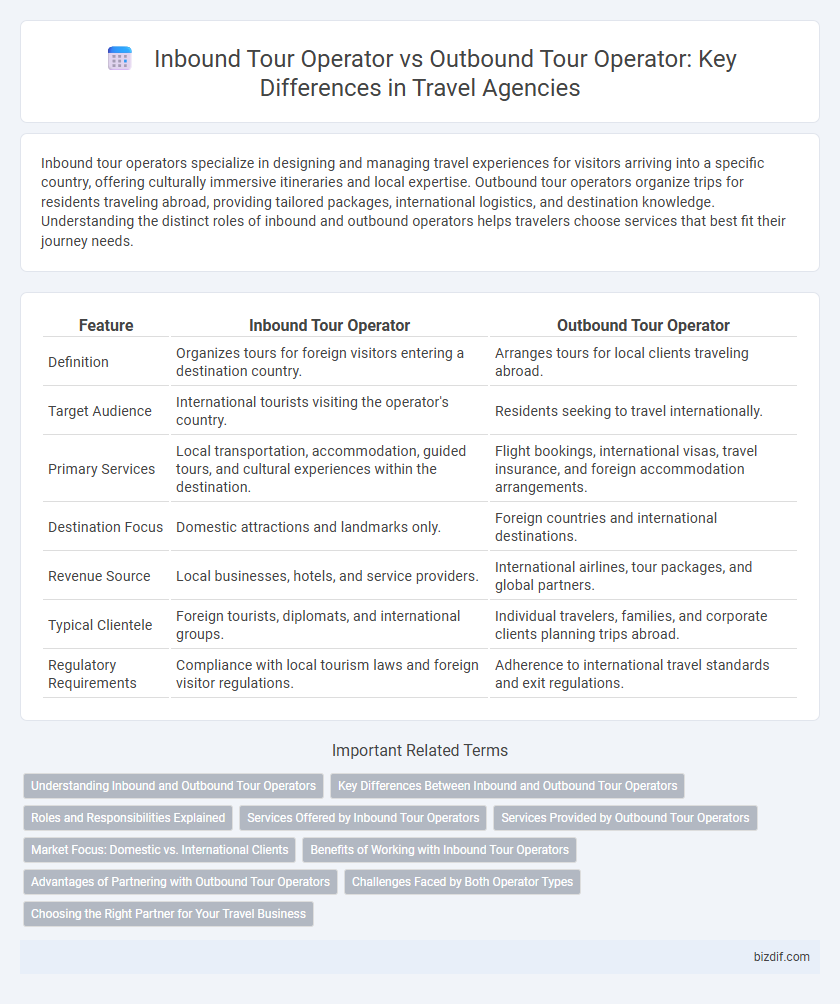Inbound tour operators specialize in designing and managing travel experiences for visitors arriving into a specific country, offering culturally immersive itineraries and local expertise. Outbound tour operators organize trips for residents traveling abroad, providing tailored packages, international logistics, and destination knowledge. Understanding the distinct roles of inbound and outbound operators helps travelers choose services that best fit their journey needs.
Table of Comparison
| Feature | Inbound Tour Operator | Outbound Tour Operator |
|---|---|---|
| Definition | Organizes tours for foreign visitors entering a destination country. | Arranges tours for local clients traveling abroad. |
| Target Audience | International tourists visiting the operator's country. | Residents seeking to travel internationally. |
| Primary Services | Local transportation, accommodation, guided tours, and cultural experiences within the destination. | Flight bookings, international visas, travel insurance, and foreign accommodation arrangements. |
| Destination Focus | Domestic attractions and landmarks only. | Foreign countries and international destinations. |
| Revenue Source | Local businesses, hotels, and service providers. | International airlines, tour packages, and global partners. |
| Typical Clientele | Foreign tourists, diplomats, and international groups. | Individual travelers, families, and corporate clients planning trips abroad. |
| Regulatory Requirements | Compliance with local tourism laws and foreign visitor regulations. | Adherence to international travel standards and exit regulations. |
Understanding Inbound and Outbound Tour Operators
Inbound tour operators specialize in organizing travel experiences for international visitors arriving in a specific country, offering local tours, accommodations, and transportation tailored to inbound tourists. Outbound tour operators focus on arranging travel packages for residents traveling abroad, including flights, accommodations, guided tours, and other services needed for foreign destinations. Understanding the distinction between inbound and outbound tour operators helps travel agencies tailor their services effectively to target either incoming tourists or local customers planning trips overseas.
Key Differences Between Inbound and Outbound Tour Operators
Inbound tour operators specialize in organizing travel experiences for foreign tourists visiting a specific country, managing local accommodations, attractions, and transportation. Outbound tour operators focus on arranging trips for residents traveling outside their home country, handling international flight bookings, visa processes, and destination packages. Key differences include their target clientele, geographic focus, and coordination with local service providers to ensure seamless travel experiences.
Roles and Responsibilities Explained
Inbound tour operators specialize in managing travel services for tourists entering a specific country, coordinating local transportation, accommodations, and guided tours to ensure a seamless visitor experience. Outbound tour operators focus on organizing trips for residents traveling abroad, handling international bookings, visa arrangements, and cross-border logistics. Both entities play crucial roles in the tourism supply chain by tailoring services to either incoming travelers or domestic clients planning foreign trips.
Services Offered by Inbound Tour Operators
Inbound tour operators specialize in designing customized travel experiences for international visitors, offering services such as airport transfers, guided city tours, and local cultural immersion activities. They coordinate accommodations, transportation, and attraction tickets to ensure seamless travel within the destination country. Expertise in local regulations and partnerships with hotels, restaurants, and transport providers enables inbound operators to deliver personalized itineraries and authentic encounters.
Services Provided by Outbound Tour Operators
Outbound tour operators specialize in organizing and managing travel arrangements for clients journeying from their home country to international destinations, offering services such as flight bookings, guided excursions, accommodation, and visa assistance. They tailor customized packages that include cultural tours, adventure activities, and airport transfers to ensure a seamless overseas experience. Collaboration with foreign partners enables outbound operators to provide local support and exclusive deals, enhancing travel convenience and value for customers.
Market Focus: Domestic vs. International Clients
Inbound tour operators specialize in catering to international tourists visiting a specific country, tailoring services to showcase local attractions and culture. Outbound tour operators focus on organizing trips for domestic clients traveling abroad, offering packages that include international destinations, flights, and accommodations. The distinction lies in inbound operators driving tourism into a country, while outbound operators facilitate travel from the home country to foreign locations.
Benefits of Working with Inbound Tour Operators
Inbound tour operators specialize in organizing travel experiences for international tourists visiting a specific destination, offering local expertise, tailored itineraries, and seamless logistics to enhance traveler satisfaction. Collaborating with inbound tour operators ensures access to authentic cultural experiences, exclusive local partnerships, and efficient coordination with accommodation and transport providers. Their deep knowledge of the destination facilitates personalized customer service, reduces operational complexities, and maximizes the overall value of travel packages.
Advantages of Partnering with Outbound Tour Operators
Partnering with outbound tour operators expands a travel agency's market reach by tapping into diverse international client bases seeking customized travel experiences. These operators bring expert knowledge of foreign destinations, ensuring well-organized itineraries and enhanced customer satisfaction. Collaborations increase competitive advantage through access to exclusive deals, strategic partnerships, and innovative travel packages tailored to outbound travelers.
Challenges Faced by Both Operator Types
Inbound tour operators face challenges such as navigating complex local regulations, managing diverse cultural expectations, and ensuring high-quality customer experiences within their destination. Outbound tour operators struggle with currency fluctuations, compliance with foreign travel restrictions, and coordinating logistics across multiple countries. Both operator types must adapt to rapidly changing travel trends and technological advancements to remain competitive in the global market.
Choosing the Right Partner for Your Travel Business
Inbound tour operators specialize in managing travel services for tourists arriving in a specific destination, offering local expertise and tailored experiences. Outbound tour operators organize trips for travelers leaving their home country, focusing on international arrangements and cross-border logistics. Selecting the right partner depends on your travel business's target market and operational capabilities, ensuring seamless coordination and customer satisfaction.
Inbound tour operator vs Outbound tour operator Infographic

 bizdif.com
bizdif.com